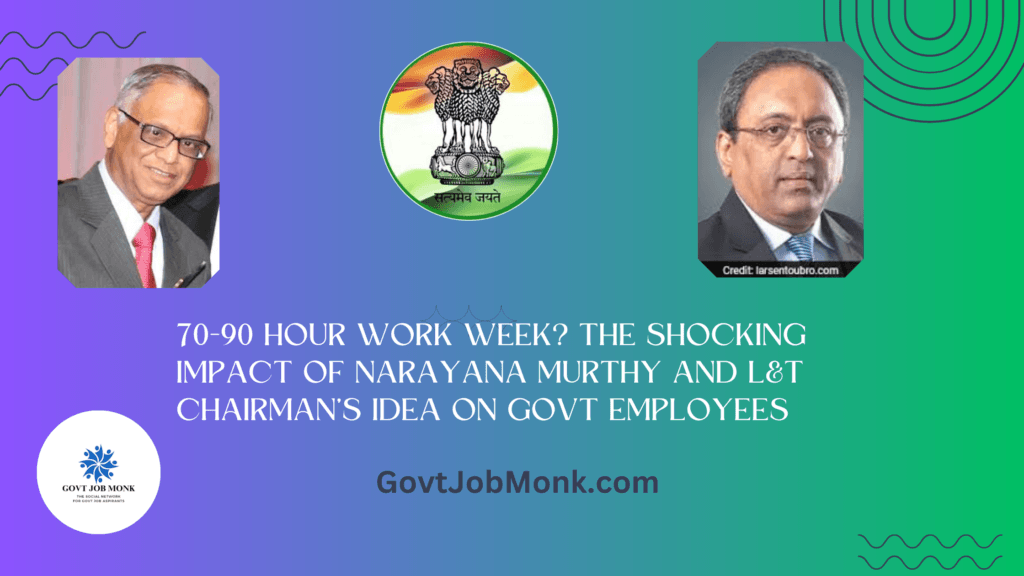Narayana Murthy and L&T Chairman’s 70-90 hour work week idea sparks debate. Is it practical for govt employees? The shocking impact on work-life balance.
Introduction: The 90-Hour Work Week Debate
Recently, Narayana Murthy, co-founder of Infosys, sparked a national debate by suggesting that young Indians should commit to a 70-90 hour work week to enhance the nation’s productivity. This sentiment was echoed by the L&T Chairman, who emphasized hard work and discipline in achieving excellence. While the private sector may have the flexibility to adopt such a gruelling schedule, implementing a 90-hour work week for government employees is neither practical nor sustainable.

In this article, we will explore the systemic, cultural, and ethical challenges that make this proposal unfeasible for the public sector.
1. Structural Limitations in Government Jobs
Government jobs are bound by established service rules and policies, which emphasize:
- Fixed Work Hours: Typically, government employees work 35-40 hours a week, as mandated by service rules. Extending this to 90 hours would require legislative changes, union approvals, and reworking labor laws.
- Overtime Restrictions: Unlike private companies, government overtime is tightly regulated and budgeted. A 90-hour work week would strain resources.
Moreover, government institutions are designed to balance efficiency with employee well-being, unlike the profit-driven private sector.
2. Role of Government Employees in Society
Government employees play a critical role in maintaining:
- Public Service Delivery: Departments like health, education, and law enforcement must ensure round-the-clock availability. However, this is achieved through shift systems, not extended individual hours.
- Policy Implementation: Unlike corporate tasks, policymaking requires deliberate, collaborative efforts. Overloading employees with excessive hours could lead to decision fatigue and errors.
Also read: IBPS Exam Schedule 2025: Complete Details and Key Dates
3. Health and Productivity Concerns
Scientific research consistently shows that working long hours leads to:
- Burnout: Mental and physical exhaustion reduces efficiency, especially in critical sectors like healthcare and law enforcement.
- Health Risks: Chronic stress, cardiovascular issues, and other health problems increase with extended work hours.
- Decline in Productivity: After 50-60 hours per week, productivity per hour drops significantly, making additional hours counterproductive.
For government employees managing public resources and services, impaired decision-making could have far-reaching consequences.
4. Cultural and Ethical Considerations
India’s public sector operates within a different cultural framework compared to private companies:
- Work-Life Balance: Government jobs are sought for stability and balance, enabling employees to focus on family and personal responsibilities.
- Union Influence: Strong public sector unions would resist such drastic changes, citing employee rights and workplace ethics.
Additionally, enforcing a 90-hour work week could exacerbate issues like absenteeism and low morale, defeating its purpose.
5. Global Comparisons: Do Governments Work 90-Hour Weeks?
Countries with high-performing governments, such as Scandinavian nations, prioritize:
- Work Efficiency: Shorter hours with focused productivity.
- Employee Well-Being: Policies promoting mental and physical health.
These models highlight that quality of work matters more than the quantity of hours worked.
Conclusion: Efficiency Over Excess
While the idea of a 90-hour work week reflects a desire for greater national productivity, it is neither feasible nor desirable for government employees. Instead of extended hours, the focus should be on:
- Streamlining Processes: Reducing bureaucratic inefficiencies.
- Leveraging Technology: Automating routine tasks.
- Improving Training: Enhancing skills for better output.
Government employees play a critical role in shaping the nation, but their contribution should come from efficient systems and balanced work ethics, not excessive workloads.
Conclusion:In conclusion, the proposal by Narayana Murthy and the L&T Chairman for a 70-90 hour work week raises critical questions about its feasibility and impact, especially for govt employees. While this ambitious approach may work in the private sector, govt employees are bound by different rules, work-life balance expectations, and productivity standards. Implementing such a demanding schedule could disrupt the work-life balance that many government workers value, potentially leading to burnout and decreased efficiency. It’s essential to consider these challenges before adopting a 90-hour work week in government jobs. Understanding the implications of such changes can help ensure that the work environment remains sustainable, productive, and balanced for all.
External Links:
- [Narayana Murthy’s Comments on 70-Hour Work Weeks (Source)]
- L&T chairman Subrahmanyan’s 90-hour work week comment reignites work-life balance debate
Join our Government Job Aspirants Community to connect with like-minded individuals and stay updated with the latest insights and opportunities – Visit Activity Page.